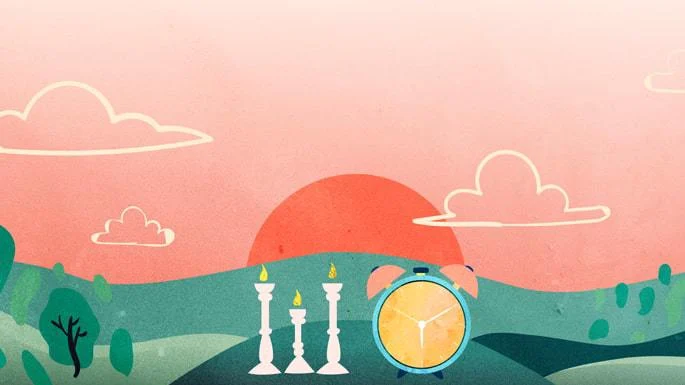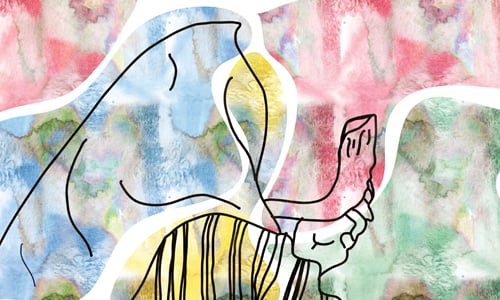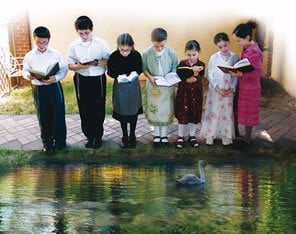
The Core of Our Faith
This week we celebrate the upcoming month of Tishrei. The Torah portion this Shabbat is Nitzavim.
The Parshah of Nitzavim includes some of the most fundamental principles of the Jewish faith:
The unity of Israel, the future redemption, the practicality of Torah and our freedom of choice. Moshe explains each of these important concepts to the Jewish people as they prepare to enter Israel and he prepares to pass away.

A Sweet New Year Begins
On Tuesday and Wednesday, we celebrate Rosh Hashana, the Jewish New Year. This is the day on which Hashem decrees the fate of all living beings. It is customary to eat sweet foods and apples dipped in honey to symbolise our request for a sweet year. On Rosh Hashana, we crown Hashem as king for the upcoming year. We blow the shofar as part of the “coronation.” In addition, the Shofar is also a wake up call to repent in honor of the new year and Day of Judgement.
On the first night of Rosh Hashanah, wish a male, “Leshanah tovah tikatev vetichatem;” for a female say, “Leshanah tovah tikatevee vetichatemee” (“May you be inscribed and sealed for a good year”)
We light candles both nights of the holiday and eat a festive meal, with round challahs, pomegranates, apples dipped in honey, fish or rams head, carrots and other symbolic foods.

Tashlich: Casting Off Our Sins
Tashlich comes from the Hebrew word meaning "to cast," referring to the intent to cast away our sins via this Rosh Hashanah custom. Special verses are recited next to a body of water, preferably one that has fish. Upon concluding the verses, the corners of one's clothes are shaken out. Tashlich is usually performed on the first day of Rosh Hashanah. It may be performed until the last day of Sukkot, except on Shabbat.
Water with fish is optimal since fish are not subject to the "evil eye.” Fish do not have eyelids, so their eyes are always open. This is likened to G d's constant supervision over us. Also, just as fish may be caught in a fisherman's net, so, too, we are caught in the net of judgment. This awareness helps awaken us to repent.
The goal of Tashlich is to cast both our sins and the Heavenly prosecutor into the Heavenly sea. And when we shake our clothes after the Tashlich prayer, this is a tangible act to achieve the spiritual goal of shaking sins from our soul.

Seeing the Good in All
When Moshiach arrives, our eyes will be opened, and we will see that even the darkest moments of Galus (exile) were vessels for goodness, it will be clearly revealed that the suffering and atrocities of Galus were in fact profound hidden kindnesses of Hashem and we will thank Him for them.

The Fast of Gedaliah
Nebuchadnezzar, king of Babylonia, had completely subdued the Kingdom of Judah and destroyed its capital of Jerusalem and the Holy Temple. He had slain or captured most of the royal family and the nobility of the land. The upper classes of the Jewish people were led captives en masse to Babylon.
However, Nebuchadnezzar did not wish to turn the land of Judah into a complete desert. He permitted the poorer classes to remain in Judah. Over them Nebuchadnezzar had appointed Gedaliah, as governor.
Gedaliah was a wise man, gentle and modest. He zealously began to encourage the people to cultivate the fields and vineyards, and thus lay the foundation of security. Under the wise administration of Gedaliah, the Jewish community began to prosper.
Ishmael, a descendant of the last king of Judah. The honor and success that Gedaliah had won filled him with cruel jealousy. Ishmael began to plot against Gedaliah. Before long he was invited by the governor to a feast on Rosh Hashanah. Ishmael arrived at the banquet in the company of ten followers. During the feast, the ruthless band attacked and slew the governor.
This murder marked the final act of the destruction of the Beit Hamikdash and thus the beginning of exile. In memory of the assassination of Gedaliah and the tragedy that it brought upon our brethren in those days, so soon after the destruction of the Holy Temple, we fast on the third day of Tishrei, the Fast of Gedaliah.